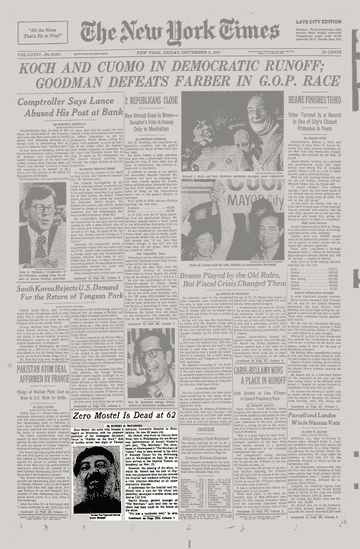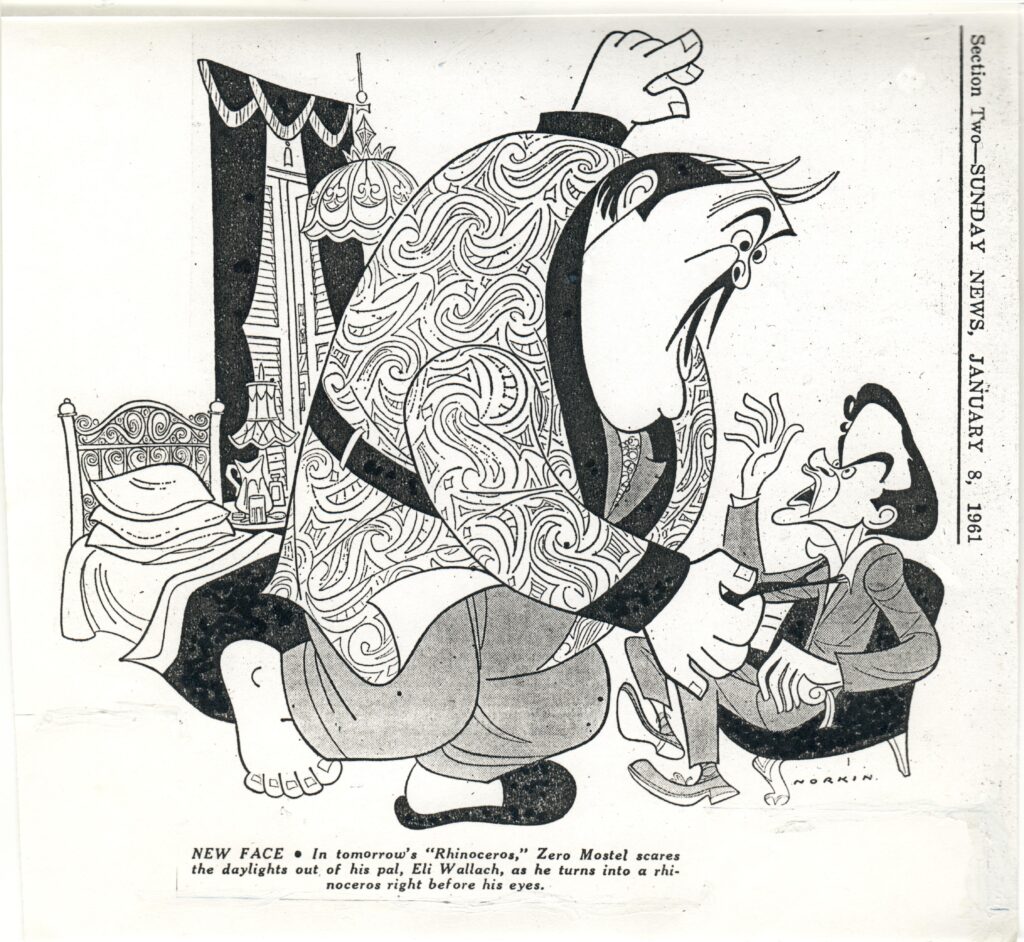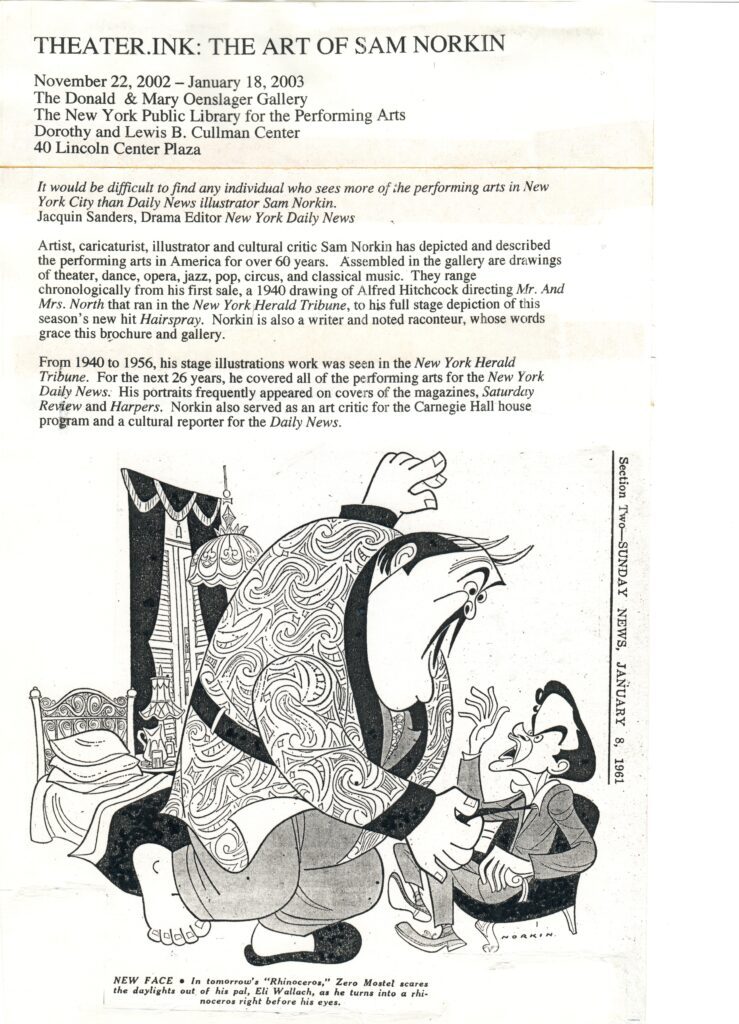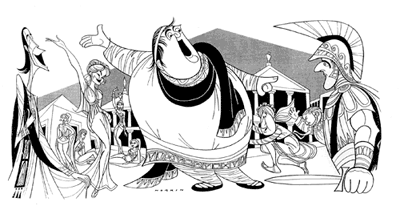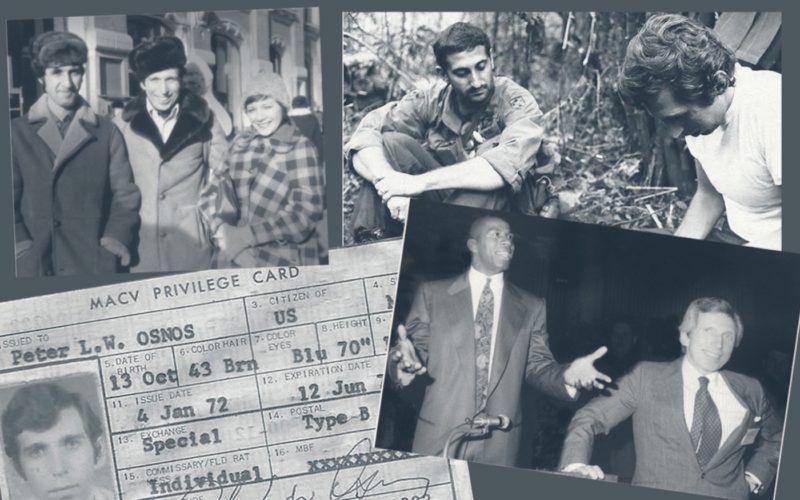Robert D. McFadden, New York Times obituary, Sept. 9, 1977
Zero Mostel, the elephantine actor who became a legend on Broadway with his poignant portrayal of the woebegotten dairyman Tevye in “Fiddler on the Roof,” died of cardiac arrest last night at Thomas Jefferson University Hospital in Philadelphia. He was 62 years old.
Mr. Mostel was the actor’s actor, the critic’s actor and, perhaps most important, the theatergoer’s actor. He made audiences roar with laughter and cry with a sense of human frailties. He could look like a pile of tires or an elephant tiptoeing across a stage with pants on. He had sagging jowls and a throbbing paunch, but his movements could be as elegant as a dancer’s and his face seemed to be made of rubber, flexing from toothy grin to terrible grimace, from pensive scowl to roaring lion faster than the eye could follow.
His career spanned nearly four decades, starting as standup comic in Manhattan nightclubs and encompassing radio, from the smallest time to the biggest.
His career had many mishaps. He was miscast in a number of his early films, like “DuBarry Was a Lady” and “Mr Belvedere Rings the Bell,” in the 1940’s. But his hits were big, especially “The Producers,” in which he portrayed a scheming Broadway entrepreneur out to make a flop. He also repeated his stage role for the film version of “A Funny Thing Happened on the Way to the Forum,” and appeared in “Panic in the Streets,” “The Enforcer,” “Sirocco”, and “The Model and the Marriage Broker.”
But it was a Tevye, the earthy Russian-Jewish dairyman in the Sholom Aleichem-based play “Fiddler on the Roof” that Mr. Mostel won his greatest acclaim. The show, which opened in 1964, went on to the longest Broadway run in history.
Money Is Vulgar’
Mr. Mostel was believed to have been paid $30,000 a week on his 10‐city tour with “Fiddler” last year, a tour that grossed $5.2 million, but he always sidestepped talk of money. “I don’t know what money is,” he once told an interviewer. “I think money is vulgar.”
He much preferred to talk about plays, characters and technique.
“I never memorize a role,” he said on another occasion. “I let the part lay in me.”
Letting the part lay in him had a special significance in his last movie role, in Woody Allen’s “The Front,” which came out last year.
Mr. Mostel played a blacklisted entertainer trying to make a comeback during the McCarthy era. In despair, the character down a bottle of liquor and lumps out a hotel room to his death. To a degree, the role revealed something of the real turbulence that beset Mr. Mostel’s own life and show business career.
During the early 1950’s. Mr. Mostel was subpoenaed to testify before the House Committee on Un‐American Activities. He denied that he was a member of the Communist Party, but political witch hunters noted that he had sponsored the National Negro Congress and the Spanish Refugee Appeal of the Joint Anti‐Fascist Refugee Committee, and he soon found himself on entertainment blacklists.
A Hollywood film contract was canceled, doors were slammed in his face and for several years Mr. Mostel devoted himself to what he called his real loves, painting and art. He worked in a little studio on West 28th Street and produced hundreds of canvasses in what he later recalled as one of the most artistically productive periods of his life.
By 1958, he was back on Broadway and was soon soaring to critical successes.
His 1958 portrayal of Everyman in “Ulysses in Nighttown,” which was derived from James Joyce’s novel “Ulysses,” won high praise but low pay.
He electrified audience in 1961 with his role in Eugene Ionesco’s drama “Rhinoceros,” in which he created the illusion of changing himself from a man into a rhinoceros with such realism that theatergoers gasped.
After the success of “Fiddler,” Mr. Mostel was ranked by many critics with such greats as Bert Lahr, Groucho Marx and two of his own idols—Charlie Chaplin and W. C. Fields.
Mr. Mostel talked about the challenge of Tevye. “He’s one of those characters who’s bottomless. In the darkest moments, he has a lightness; in the lightest moments, a darkness.”
Mr. Mostel might have been talking about himself rather than the full‐bearded milkman who carries on one‐sided dialogues with God about the problems of his family and life in an impoverished village called Anatevka in Czarist Russia.
The Belnord! “Mr. Mostel and his wife, Kathryn, former Radio City Music Hall Rockette whom he married in 1944, had two sons, Joshua and Tobias. The couple lived for years in a 10‐room apartment overflowing with books and art work.”
Robert D McFadden, New York Times obituary
